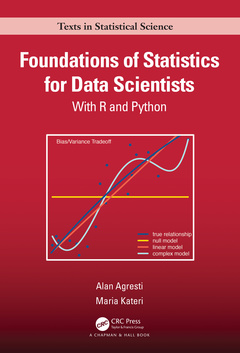Foundations of Statistics for Data Scientists With R and Python Chapman & Hall/CRC Texts in Statistical Science Series
Auteurs : Agresti Alan, Kateri Maria

Foundations of Statistics for Data Scientists: With R and Python is designed as a textbook for a one- or two-term introduction to mathematical statistics for students training to become data scientists. It is an in-depth presentation of the topics in statistical science with which any data scientist should be familiar, including probability distributions, descriptive and inferential statistical methods, and linear modeling. The book assumes knowledge of basic calculus, so the presentation can focus on "why it works" as well as "how to do it." Compared to traditional "mathematical statistics" textbooks, however, the book has less emphasis on probability theory and more emphasis on using software to implement statistical methods and to conduct simulations to illustrate key concepts. All statistical analyses in the book use R software, with an appendix showing the same analyses with Python.
Key Features:
- Shows the elements of statistical science that are important for students who plan to become data scientists.
- Includes Bayesian and regularized fitting of models (e.g., showing an example using the lasso), classification and clustering, and implementing methods with modern software (R and Python).
- Contains nearly 500 exercises.
The book also introduces modern topics that do not normally appear in mathematical statistics texts but are highly relevant for data scientists, such as Bayesian inference, generalized linear models for non-normal responses (e.g., logistic regression and Poisson loglinear models), and regularized model fitting. The nearly 500 exercises are grouped into "Data Analysis and Applications" and "Methods and Concepts." Appendices introduce R and Python and contain solutions for odd-numbered exercises. The book's website (http://stat4ds.rwth-aachen.de/) has expanded R, Python, and Matlab appendices and all data sets from the examples and exercises.
1. Introduction to Statistical Science 2. Probability Distributions 3. Sampling Distributions 4. Statistical Inference: Estimation Skip Product Menu 5. Statistical Inference: Significance Testing 6. Linear Models and Least Squares 7. Generalized Linear Models 8. Classification and Clustering 9. Statistical Science: A Historical Overview Appendices
Alan Agresti, Distinguished Professor Emeritus at the University of Florida, is the author of seven books, including Categorical Data Analysis (Wiley) and Statistics: The Art and Science of Learning from Data (Pearson), and has presented short courses in 35 countries. His awards include an honorary doctorate from De Montfort University (UK) and Statistician of the Year from the American Statistical Association (Chicago chapter).
Maria Kateri, Professor of Statistics and Data Science at the RWTH Aachen University, authored the monograph Contingency Table Analysis: Methods and Implementation Using R (Birkhäuser/Springer) and a textbook on mathematics for economists (in German). She has long-term experience in teaching statistics courses to students of Data Science, Mathematics, Statistics, Computer Science, Business Administration, and Engineering.
Date de parution : 11-2021
17.8x25.4 cm
Disponible chez l'éditeur (délai d'approvisionnement : 14 jours).
Prix indicatif 103,03 €
Ajouter au panierThèmes de Foundations of Statistics for Data Scientists :
Mots-clés :
Simple Random Sample; Binary Response Variable; Simulated Sampling Distribution; Roc Curve; Linear Discriminant Analysis; Sampling Distribution; Practicing Data Science; Classification Tree; Sample Data Distribution; Explanatory Variable Values; Approximately Normal; Horseshoe Crabs; Normal Sampling Distribution; Carapace Width; CLT; Fisher's Linear Discriminant Function; Linear Discriminant Function; Exit Poll; Delta Method; Inferential Statistical Methods; Hidden Units; Linear Probability Model; Academic Statistics Department; Classification Table; Adjusting Error Rates



